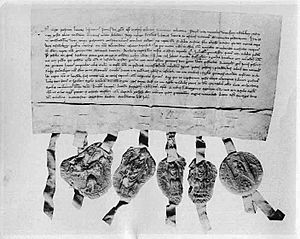Corporation facts for kids

A corporation is a special type of organization. It is recognized by law as a separate "person" or entity. This means it has its own rights and responsibilities, different from the people who own or work for it. Most corporations are created to run a business.
Corporations follow specific rules called corporate law. These rules help balance the interests of everyone involved. This includes the people who manage the company, those who lend it money, and the shareholders who invest in it. Employees who work for the company and the customers it serves are also important. Today, corporations play a huge role in how the world's economy works.
One important feature of a corporation is "limited liability." This means if a corporation runs into trouble and cannot pay its debts, the owners (shareholders) usually only lose the money they invested. They are not personally responsible for the company's debts. Employees might lose their jobs, but they also won't be responsible for the company's debts.
Even though corporations are not real people, the law treats them almost like people. They can have rights and responsibilities. They can even be held accountable for certain actions. Just as a person is born, a corporation is "born" when it gets a special document called a certificate of incorporation. They can also "die" if they lose too much money and become unable to pay their debts.
While corporate laws can be different in various places, most business corporations share five main features:
- They are seen as a separate legal entity.
- They offer limited liability to their owners.
- Their ownership, called shares, can be easily bought and sold.
- They have a central management, usually a board, that makes decisions.
- Many people can own parts of the company by investing money (capital).
History of Corporations
The word "corporation" comes from the Latin word corpus, which means "body" or "a body of people." Organizations that acted like businesses and had legal rights existed a long time ago in ancient Rome and India. In medieval Europe, churches and local governments, like the Pope and the City of London Corporation, also became incorporated.
The main idea behind forming a corporation was that it could last forever, even after its original members were gone. The Stora Kopparberg mining community in Falun, Sweden, is thought to be the oldest commercial corporation in the world. It received its official permission from King Magnus Eriksson in 1347. Many European countries also created corporations to lead their efforts to explore and settle new lands. Famous examples include the Dutch East India Company and the Hudson's Bay Company. These companies played a big part in the history of colonization.
Related pages
Images for kids
-
Replica of an East Indiaman ship of the Dutch East India Company (VOC).
-
A bond issued by the Dutch East India Company (VOC) in 1623, for 2,400 florins.
-
This chart shows the stock prices of the South Sea Company. Its rapid rise in the 1710s led to a law in 1720 that limited new companies without a special royal permission.
-
Lindley LJ was a top expert on company law. He was involved in the important Salomon v. Salomon & Co. case, which confirmed that a company is a separate legal entity.
See also
 In Spanish: Corporación para niños
In Spanish: Corporación para niños
 | Precious Adams |
 | Lauren Anderson |
 | Janet Collins |







